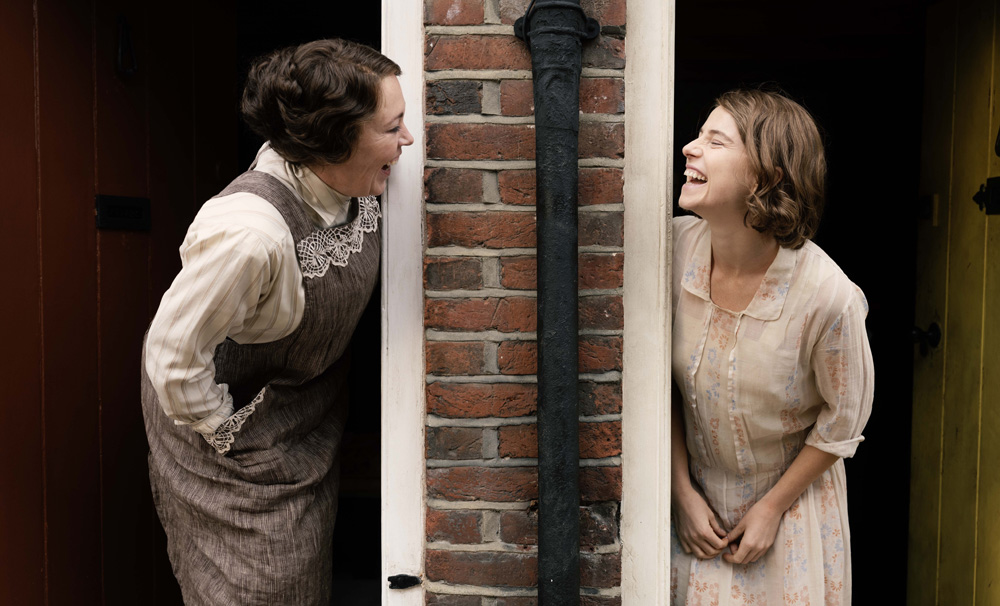Unlike the characters in “Wicked Little Letters,” Thea Sharrock couldn’t help but be delighted upon receiving a thick envelope in the post, containing Jonny Sweet’s barbed screenplay based on real events from post-World War I England in the quiet beachside community of Littlehampton, Sussex. Far removed from the front lines yet the impact still lingers, the savvy comedy finds a battlefield still full of land mines as the country is at a pivotal moment, finding neighbors Edith (Olivia Colman) and Rose (Jessie Buckley) as reflections of its past and future when the latter can swear up a storm, trying to forge a life for herself and her daughter after her husband died in service, while the former watches her words carefully, still beholden to her strict God-fearing father (Timothy Spall). The two may initially get on like a house on fire when their personalities are complimentary when they can each see something in one another that the other lacks, but when a mysterious and obscene letter makes its way into Edith’s mailbox, all hell breaks loose, requiring a local constable (Anjana Vasan) to look into the situation as her male counterparts dismiss it as a catfight.
In the wrong hands, “Wicked Little Letters” might look like nothing more either when it would be enough to simply see Colman and Buckley go for the jugular, but beyond its stellar cast, Sharrock and Sweet envision a tale of empowerment as the seeds of suffrage were starting to be planted in the U.K. and women could realize that they weren’t one another’s enemy but rather it was a culture that was pitting them against each other. While Sharrock has specialized in tender dramas since making the leap from acclaimed stage director to the screen with such films as “Me Before You” and “The One and Only Ivan,” she brings a light but firm touch to her first out-and-out comedy, making sure performances are rooted in real character rather than comic caricature and balancing out all of the film’s colorful language with a warm, inviting palette that ensues that no one is working too blue.
Remarkably, it is one of two major films that Sharrock has in release this week when the director also helmed “The Beautiful Game,” an inspirational soccer tale starring Bill Nighy for Netflix, and while the director clearly would like to be the last to be recognized on a production, her name in the credits has become a clear mark of quality and it was a privilege to get to speak to her about attending to the needs of an acting ensemble with different approaches to the material, how she encountered a new workplace hazard of laughing too much on “Wicked Little Letters,” and all the work that went into the film’s opening scene to set the right tone.
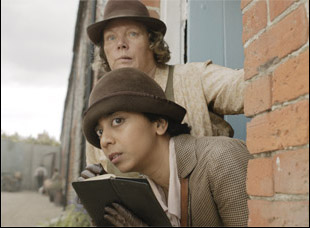 What sparked your interest in this?
What sparked your interest in this?
It’s very rare that you get sent a script that makes you laugh out loud as much as this one did, so I knew that it was special on that level. Then on top of that, to learn that it was a real story was like, “Whoa, this is gonna be a much wilder ride than I think I could have anticipated.” Then to learn that Olivia Colman was already attached to play Edith, I was in at that point, for sure.
She and I together wanted to go immediately to Jessie Buckley, who is a great friend of hers, and [they] worked together a couple of times, but never actually at the same time on set. Jessie was desperate to do it. After that, you can imagine the reaction that we got from other people as we would start to go towards them for the other more ensemble parts. The reaction to the script was great, but then also to know that Olivia and Jesse were gonna be heading up the cast was a fantastic invitation.
Anjana Vasan also seems to make a name for herself here. What sold you on her?
I had never met Anjana before, but I knew her work and the minute I met her, she’s funny and quick. She interrogates the script in a really interesting way and she was immediately drawn to play a real person and to walk that tightrope of how much you take from the characteristics of a real person as much as you can discover from somebody 100 years ago, where that meets what you naturally bring. All three [lead] actors have very different processes in terms of how they reach and what they need from a director.
Every actor is different. Everyone needs something else, and they also change what they need as they go along. Sometimes they want you close and other times they want to do it by themselves. And these three were so respectful of each other and so generous to each other that it was really wonderful. Then to put somebody like Tim [Spall] in the middle, who could not be more opposite in every way to his character off set, —he was just the most warm, quiet, thoughtful, calm and then he gets on set and he could just let rip like that — it was amazing to watch.
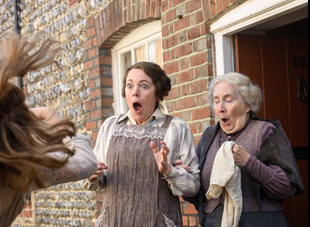 From what I understand a lot of the text from the letters came from the real documents. Were there ever times you might’ve thought it was too over-the-top?
From what I understand a lot of the text from the letters came from the real documents. Were there ever times you might’ve thought it was too over-the-top?
We were too busy crying with laughter, to be honest, so I knew we were onto a good thing. I never took any out. There were a couple of moments where Olivia went a little bit rogue and made a few things up, but really only one or two. Almost all of the written letters are derived from the original source, which is wild. But the tone of them is such that I think if we’d flooded the movie with many more, you may have lost the joy of them. You always want to leave an audience wanting more, right? Similarly, if we’d had much less, I don’t think they would have come to life quite in the way that they did and they play such an important role because they literally [act like] somebody finding their voice for the first time, so you have to have a certain amount in order to tell that part of the story.
When the film has such a madcap energy to it, what was it like finding the rhythm?
I knew that the rhythm of the piece was going to be really important to it as a whole, something that is so multi-layered and multi-textured and trying to create the balance between essentially comedy and drama was going to be what I needed to be most wary of throughout. Particularly with the comedy, the pacing was everything and it’s very different to stage. The camera responds to the comedy in a very different way. In some ways, it’s really helpful and you can do things with the camera that you can’t ever do on stage and how you can cut between things, but there is something in real life that is magical and you can’t recreate on camera, so I studied that a lot and went in very much with quite a fixed idea of what I needed from the actors in order to give me as much as possible in the cutting room later, so that I could then dictate what the pace would be.
It seemed like you really could push the style of this in ways you haven’t before with the arch tone, which is matched by those upward shots that play into the comedy of it. Was that an exciting prospect?
Every time you do something, you learn from it, right? If you do something well, you know you feel more confident going in next time. Similarly, if you do something and you think, “I never quite got that,” you can learn from that for the next thing that you do, so we take all of our life experiences into the next room that we go into and this in particular, I worked with an amazing [director of photography] Ben Davis, whom I’d never worked with before. In many ways I was ready now to work with him and we very quickly learned when he would lead and when I would lead and when I would ask questions and not be sure and when he would ask questions and not be sure. There was a real simpatico between us, and we felt very brave together. I’m sure a lot of the choices came from a very instinctive [place], but I was so supported that I felt very confident with with a lot of the choices that we made.
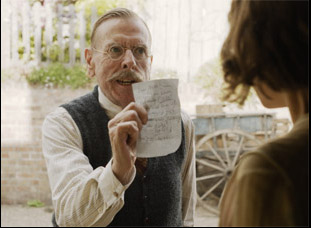 Something that’s been quite visually striking in all of your films is how you’ll employ this understated color palette where it really feels like life breaks through. What was it like developing that for this film?
Something that’s been quite visually striking in all of your films is how you’ll employ this understated color palette where it really feels like life breaks through. What was it like developing that for this film?
Color’s always been really important to me. Of course, starting out in theater, that’s one way to learn what color does and how light imposes itself with color. The minute you introduce a camera into that, it changes again, and you learn very quickly the power of color and light, but you can go on a really wonderful journey once you realize how much you can actually control it. So I take great care of how color is used in my movies and with this in particular, I wanted it to feel almost like an old photograph where when there is color, the color pops.
For example, I held back hugely on red so that whenever you see the letterbox, it really pops. Then when we shot the girls scene on the beach, obviously we were lucky when the blue in the sky was exactly what I wanted to have, but the simplicity of the sky and the sea and the sand, particularly when we get in those big wides, and then one woman is basically in white and one is basically in black could really stand out. Some people are very conscious of that, and lots of people aren’t, but for me, these are really important choices and details when you’re building a world when you build a film.
You’ve said that the opening scene for the film was tough to crack, which may have been referring to cutting it together, but you set it up so nicely with those two doors of different colors. What was it that unlocked the right tone for you?
In the script, it basically started with the description of the two doors and one woman coming out with the tub and then the other woman coming out and taking the tub. But I knew that I wanted something to soft land into that world, so we created a much bigger shot than is currently there for the opening scene. What was interesting is that once it was there, it just didn’t quite feel right because it felt imposed. It felt like it was me having a clever idea, which was cool, but it was suddenly all about me and that is when you know things are not quite right. It’s the same with an actor. When an actor starts performing in such a way that you can only see the actor, you can’t see past them to the character, you know you’re in trouble. But when an actor can let go of themselves to such a point that you stop seeing the actor and you just see the character, that’s when you know you’ve struck gold. So finding that balance in the very, very opening took a while to get it right. Music helped enormously. We kept getting it wrong. And then finally I knew we were onto something. That’s the other thing with editing. It’s so layered that sometimes it comes quick and sometimes it comes slow.
Was there a particularly wild day on set for this?
There were a couple of wild days. To be honest, whenever I had the two girls together doing a scene together, you could feel it on set. It was palpable. They’re such powerhouses. They’re so respectful of one another, and they’re just so talented that we always knew that we were in for a good day. And they give so much to each other. For example, the big swear-off scene at the end took us a while to get through. I think they felt the real pressure because they knew that that had to be really funny and they felt the weight of that, but equally there were moments where we just have to go again because too many of the crew or me, as Olivia was reminding me today, I just couldn’t hold back [from laughing]. Olivia said she could almost always see my shoulders shaking, like just off out of her eyeline. But that’s a gift. It’s joyous to work with such people who can invest so much in it, that when it’s funny, it’s really funny.
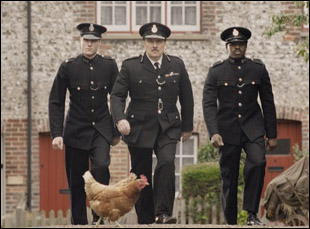 From what I understand, the reason that everybody in the cast is so amazing is you might’ve had to do with the fact you brought in a few ringers from the stage that you had worked with before.
From what I understand, the reason that everybody in the cast is so amazing is you might’ve had to do with the fact you brought in a few ringers from the stage that you had worked with before.
Yeah, there were a few people whom I’d worked with in the theater many years ago, who I just knew would understand the craft behind the comedy and behind the language. I don’t just mean the rude language, but how tightly the script was written. Not all actors are great with chunky, wordy dialogue, so I knew that I needed a certain caliber of actor and it was wonderful. Somebody like Joanna Scanlan, for example, was in the first play I ever directed and we somehow haven’t worked together since then, so to bring Jo back into this, who is so perfectly cast, was just brilliant. She understood the script perfectly and she understood the story I was wanting to tell. That was just such a delight for me to have her back with me again.
It blows my mind that this is actually one of two features you have coming out this week with “The Beautiful Game” also bowing on Netflix, and you were in post on that film when you first read the script for “Wicked Little Letters.” What’s it like to have them both come out at the same time?
It’s pretty wild. I could never have imagined it quite happening like this. And to put it in the context of the industry having had such a hard year last year, it’s really magical to be able to bring two movies that obviously I worked so hard on. And by the way, Graham Broadbent for Blueprint was my producer on both movies and he was my total support. He was a real mentor for me on both and the other project was something that he’d been working on for many, many, many years and then brought me on to direct it. Whereas [“Wicked Little Letters”] was something that was brought to me and then I brought him onto it, so it was amazing to have him in my camp next to me on both movies. And it’s really wonderful to be able to bring them both out rather at the same time. They’re very different movies, but I’m very proud of both of them. They both have real heart in them, and I’m really proud, maybe above all, of the performances. I’ve been blessed on both projects to work with fantastic actors and it makes me very proud when I can hear people recognizing how hard the actors worked. That’s the best part of my job.
“Wicked Little Letters” opens on March 29th in Los Angeles at the AMC Century City and the Grove and New York at the Lincoln Square 13, the Regal Union Square and Cinemas 123. It expands nationally on April 5th. A full list of theaters is here.




